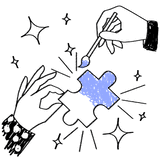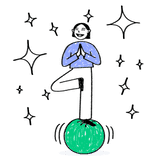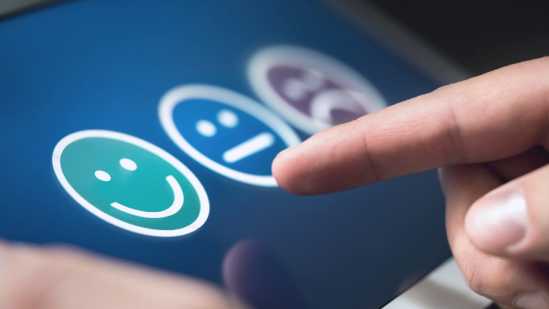Alex Killick and Sharon Green are not only experienced people professionals, but also co-founders of the movement Be The Ripple. Their mission is "to create a ripple effect of kindness that will operate collaboratively across sectors to pool resources, share ideas, share what works with regard to kindness in practice and develop strategies that are effective and can be shared. Professionals inspiring other professionals and acting as a catalyst for positive change to our working world."
Sharon Green is a Chartered Fellow CIPD (the UK professional body for people professions), has an MA (Human Resource Management), and a Post Grad Dip. in Health Education & Promotion. Sharon works with clients from start-ups to global corporates and specialises in people change projects, from large-scale transformations to smaller-scale change initiatives with a focus on technology, the employee experience and comms, and engagement skills. Alex Killick is the Director of Leading Kind, where he as a culture consultant helps organisations improve their outcomes through building kinder workplaces. He is a co-author of the Little Book of Kindness and is working on a Ph.D. where his focus is Kindness in the workplace.
Building kind workplaces
Alex: Good afternoon. Thank you very much for having me. My name is Alex Kilic and I'm the director and founder of Leading Kind, a small boutique consultancy. We call ourselves Culture Consultants and our mission is to help make work kinder, workplaces fairer and outcomes better for our clients.
I've spent probably the best part of 30 years or so working in HR and that space at various different organisations. And for the last, I suppose, ten years I spent a lot of time in the University, which is also the place which was supporting me to do a PhD, and my focus has been on "Kindness in the workplace". So I have an academic interest, although I'm a terrible student, so I'm not making much progress in that regard.
Nina: Thank you. Very glad to have you here.
Alex: Thank you.
Sharon: Hi Nina, it's lovely to be here today. I'm Sharon, Sharon Green. I'll get the qualifications list out of the way first, which is probably a good thing to say. So I'm a Chartered fellow of the CIPD, which is the People Management and Development professional body, I suppose.
I have a passion for people change with the tech and comms and engagement kind of flavour. But I also hold a Master's in Human Resource Management. And also, I think it's probably relevant to mention that I've got a postgraduate diploma in Health Education and Promotion, which kind of is a little bit random, but it gives the flavour of behavioral change. But from a health context, which I think is really interesting in a people management and development role as well.
I'm a trained coach, most of the time I spend doing projects and program management, and really I'd class myself as a professional interim consultant, and that's what I've been doing for the last 15 years. I've got my own business, a business called Chiara Consultancy, and I'm a co-founder of Be the Ripple, which appealed and spoke to me personally as well as professionally. So I was delighted to be there and my company itself, it kind of matches, really. I want to help companies change, innovate and maximise the power of their people, and I think kindness, that kind of fits in there somewhere. So I'm looking forward to our conversation this afternoon.
Nina: Thank you, so am I.
Alex: Sorry, Nina. I forgot to mention I'm also a co-founder of Be The Ripple.
Nina: Maybe you want to tell the viewers a little bit about this movement, what it stands for, what the mission is and how it all came about?
Sharon: I'm going to say a little bit because I think Alex probably can expand on it because I know he's got his "Book of Kindness" that he co-wrote with one of our other co-founders.
But for me, Joanna Suvarna, who you mentioned as our common connection, Jo founded Be The Ripple. It comes from a very personal and professional space for her. And when she founded it, I think a whole number of the starting co-founders congregated around Jo because we felt it spoke to us in personal and professional ways. So for me, I'd articulate Be The Ripple as a movement founded by a number of co-founders internationally. It is about thinking about the world of work, the world of organisations, our communities. And wouldn't it be a better place, safer, better, more productive if we have kind cultures at the center of that?
And that spoke to me personally. And that's the reason why I wanted to be in as a co-founder. So I'm going to pass over the mantle to Alex because I'm sure he's got some other great stuff to say about Be The Ripple.

Alex is one of the authors of The Little Book of Kindness – a book about how to build kinder workplaces.
Alex: I guess my observation would be that a number of us will have had personal experiences during the course of our lifetimes, our working lives where we've probably experienced unkindness. So actually, a lot of the narrative has been about psychological safety or how workplaces make people ill. I think that was a bit of a context for people to come together.
So, if we know there's a lot of bad things that go on in the workplace, what are the things that you can do to flip that and make work a better, more positive experience? Because if you feel better, if you feel more positive, if you feel that you want to come into work, it's a place you want to be, you're going to give of your best self and the company or the organisation should feel the benefit of that.
And yet that doesn't seem to be the experience. So we were trying to find a way of using our collective wisdom, experience, and, I guess, the knowledge that people had to spread the love, share the light. We started a movement, and I don't think we intended really to start a movement, but we had a passion individually and collectively for wanting to make the world a work better.
And I guess that's why we're here and probably why we on behalf Be The Ripple are talking with you today.
Nina: Speaking of kindness, before we move on, maybe we should try to define what we mean by that. I know we spoke earlier about the difference between being nice and being kind and what kindness at work actually means. Is that something you could perhaps elaborate a little bit on?
What does kindness at work mean?
Alex: When we talk about kindness at work, that takes just a bit of thinking through. So if we would have a conversation about kindness generally, you kind of know what it feels like. In the context of the pandemic, over the last 18 months, we've seen an outpouring of kindness where people have genuinely for the sake of their fellow men and women gone out of their way to be helpful, to do positive things, and quite often they'll do it just because that's the right thing for them to do, it's not something that they feel they need credit for, and it's not something that they necessarily need to get reciprocity for. So you don't necessarily give something to get something back.
Actually, there's quite a lot of evidence to suggest that the power of giving is quite satisfying for the individual that gives there's quite a positive endorphin glow if you like. So there's a lot of biology in this, which I think is interesting.
But if you take "K" for "Kin", which I think is interesting because that's the root, the etymology of the word which is around, I think originally nation, it's around family, it's around humans connecting together. So that's at the heart of what kindness is about: what connects people.
So "Kin" is kind of the K there. "I" is for "Intention". And for me there's something quite specific about the deliberate nature of being kind as opposed to it just being random and being thoughtful and purposive about it. "N" is for "No Nonsense". You allow people to be their authentic selves. "D" is for "Diversity" and celebrating and embracing difference.
"N", the other n, is for "Noticing" how people are, giving employees a voice, actively listening and acting on feedback, "E" for "Expectations", set high standards, and expect every member of the organization to do the same. “S” is for "Stretch Kindly" and actively encourage personal development. Hence the other "S" is "Speak Kindly" and give feedback to others in a constructive way.
So what may seem a bit of a twee kind of alliteration of the word kindness, actually, for us, gives quite a useful context in terms of defining what we mean in the workplace environment.
Sharon: And the difference for me between kindness and niceness is I think that there's something superficial about niceness in my eyes. I've worked in a number of organisations where I see lots of niceness, but not a kindness and consideration or an honesty with the people that they work for. It feels very on the top on the civil interaction level, and not really much deeper than that. Whereas I think kindness is a bit more thoughtful and intentional, as Alex said, really.
Alex: I guess my starting point it comes back to HR understanding what the role of HR is in the organization, and I think also helping the organization to understand what that is, because what HR thinks its role is and what the organization thinks its role isn't always the same thing in my experience.
So rather loftily, I've kind of described our job description in other places and other times as rather than custodians of control, I think our job is to be guardians of the soul. Which sounds very kind of lyrical and interesting. But I guess what that means is that we are the one place in the organisation that can hold the mirror up, that can ensure that the values that are being espoused are being lived.
So I don't mean that we're the police, but I think we have a job to ensure accountability is maintained. And particularly, I guess, I'm talking about leadership and leaders.
I think HR taking stock in terms of what it's had to deal with over the last 18 months. My observation is HR has really stepped up. And to take your analogy about the bank account, I think a lot of credit has been put in the bank because of the work that HR has done in order to, I think, demonstrate how it's helped organisations survive and thrive during the most difficult couple of years.
And if that isn't a platform, if it's not an opportunity to think and test differently, how we might do things in future, then I worry that we go back to or we slide back into the old ways because it's just more comfortable and convenient. And we'll look at the data, we'll look at the outcomes and we'll wonder why we've not made the impact.
So there isn't an easy answer for any of this. I do think it's kind of predicated on getting better at demonstrating what works and what doesn't work.
Is there a business case for kindness at work – and do we even need one?
Nina: So, is there a business case for kindness? Is that where the sort of obstacle is, that many organizations still don't realise or still don't believe that there is? They think it's sort of like a "nice to have" thing, this “cultural thing”?
Sharon: For me, I think there's something, like I said, I think that kindness, if you think about that as a driver, it might kind of feel almost like it's a given and like we can't unpack and articulate what that actually shows up in the workplace. Or it feels too nebulous, maybe, for people to kind of use as a central driver. I think that for me if I think about the original question about the challenges, which I think leads into "kindness is a KPI" and the focus of our discussion. If I think about the challenges from a people perspective, I wonder from an HR function point of view, whether there's a real pressure to focus on the bottom line? And therefore thinking about kindness – how does that fit into that?
And some organizations through the pandemic will have boomed and others will have come under severe financial pressure to get through the pandemic, and there'll be lots of businesses in between. And so I think that maybe the pressure, the focus on the bottom line, and the evidence point that Alex pointed to, there's been a strive and a pressure for the people function to show to be evidence-based. So, therefore, can we produce evidence for this, and how easy would that be to be able to do that? I also wondered if there's a sense that HR has worked really hard as a function to move away from policy police, as Alex said, or the "tea and tissues" kind of image.
Alex: I agree. I think in terms of some of the challenges for HR, defining the function and being clear what the role is, that's a difficult place to be. But I think regardless, I think now is an opportunity for HR to use the credit that it has in the bank to make more of a difference.
Even if your angle is well-being. So kindness, your organization might not be ready for it because they haven't caught up with the terminology. And despite the fact that it's now in the vernacular, I think means that it's easier to do so.
If I'd start to have conversations about kindness five years ago in the workplace, I probably would have been lynched. It would be like, what on earth are you talking about? It was just not vocabulary, whereas I think today leaders are talking about kindness, and it's a good thing, and those organizations seem to be doing well on the back of it.
So I think some of the issues that get in the way are competing priorities. So making a case for kindness on its own probably is not enough. It's making a case that's going to impact and improve the business bottom line. However, you define that. I think one thing I'm interested in is leaders being held to account for "the how" as well as "the what" and what I mean by that is shareholders, boards. They tend to be interested in that bottom line, and they almost don't care how that's arrived at.
Whereas I think if you have governance where they are concerned about the impact, the human impact and human consequences, then you'll get a different behavior from leadership at the top, and that will permeate. I think it's an old saying, "the fish rocks from the head", and so everything else flows from that. If you create the right tone, set the right cultural cues for the organization, then that creates the climate and culture where people can thrive, can be themselves. And I think Sharon and I would argue that that creates the conditions where people do their best work.
We all want, I think, as people professionals to create the conditions, or to create the opportunity for leaders to create the conditions, where people can come in and be their best.
Sharon: When I was thinking about this, "kindness as a KPI" and the business case for kindness. My first question was, do we really need a business case to do what we believe is in the best interests of our customers, people, supply chain, business? I was thinking to myself, if we believe that it would make work or an organisation a better place, do we need a business case, was my first kind of thought?
Alex: No, I mean, everything you say is absolutely right. And I guess, if I play that back to the conversation or the narrative around employee engagement, maybe a decade ago – HR, basically, was talking about sickness absence and labor turnover. That's what we'd come to the table with. And it's actually not very helpful, not least because sickness absence focuses on the kind of the 3 or 4% of the organisation, not the 97 or 96% of the organisation that you really want to kind of find out. So we were measuring the wrong thing at the wrong end.
And we still need to measure it. That's fine. But that was the only tool in the box. And what I found fascinating about employee engagement was it almost unleashed a whole different approach to analytics and helped HR catch up, because finance and marketing had all the tools and they had all the space for the conversation at the board table. What was fascinating about even a simple approach to measuring employee engagement using effectively a qualitative methodology that you quantified in order to kind of put some numbers around it is that for the first time, HR, we're in the position to be able to say, "look, we've got a measure here of how awful the organisation's feeling and how good it is over here. If we do this, this and this, we can transform the bottom-line impact".
The presentation, I remember was with the HR director of B&Q, and he said, basically, by shifting the dial from whatever it was, 26% engagement to 50% engagement, that's £120,000,000 on the business. Now, as soon as you start to talk that language, the chief exec and the director of finances, the CFO, their ears perk up.
So this stuff is actually quite important because it helps us do what we need to do. And I make the same, I guess, comparable comment around kindness, however, defining it. And I'm open to the view that actually kindness might be old wine in new bottles, or no, new wine in all bottles. It could just be that it's the zeitgeist. It's something that we are kind of talking about, but actually in terms of people practice on the ground, it might just be that we've already invented the wheels. We've just given it different labels.
Kind leadership for a better employee experience
Alex: What is interesting, I think, in terms of evidence is that there is increasingly good evidence about the relationship between good leadership being synonymous with kind leadership. And I think that's interesting.
So the whole idea of empathetic leadership is now receiving a lot of traction, and leaders are buying into that. Whether they read the books or watch YouTube clips, it's now beginning to percolate as actually, this stuff makes a difference; how I lead, how I treat my people, how I listen, all those things make a difference. And there's also quite a lot of good evidence that it reinforces the positive impact that kindness has on, for example, employee wellbeing, relationships, creativity, and ultimately, performance. So it's not that kindness, we don't need to necessarily make a separate case for kindness. But I think the relationship that kindness has with those other aspects or traits of kind of how people are on the ground is important.
So I'm agreeing with you, Sharon, that it's there and it makes sense. I just think we need to find a way of using it as a lever in order to, I guess, crank up the impetus. There's a lovely piece by a guy called I think it's Dacher Keltner, who's an American psychologist, academic, and he uses Darwin, and he talks about the survival of the kindest as opposed to the survival of the fittest.
If you take a kind of evolutionary model, we are programmed at the moment on the survival of the fittest. And based on what I've heard from Cop 26, which is quite current for us and particularly for me in Scotland over the last couple of weeks, what you want is a bit of hope that the planet is going to be saved and we're going to do the right thing. But everything we do, as institutions, as organisations, as individuals, is driven by that survival of the fittest. And that means, you know what, if some people or some Islands or whatever have to give way in order for a few of us to make it, then that's the model, whereas actually survival of the kindest is about recognising no, no, this is a common threat. It's existential.
It's for all of us as humanity to work together to find the right and best solutions, which means changing how we do things. And I think that's just a fascinating observation about how work and workplaces could be different going forward. There is talk in the UK, I don't know if it's global, I think maybe it is global, I think I heard it in some American discussion as well about the "great resignation".
So there's something about this, there is a pent-up view that the workforce is about to jump off because of the dissatisfaction that it has with the status quo. And I guess those organisations which have woken up and smelt the coffee and are busy trying to build a better, more authentic future for their organisations and their people, will be the ones that benefit from getting the talent, whether it's scarce or less scarce in the future.
Nonetheless, it will be interesting to see whether people do jump off because they reached a point which says, I'm not going to continue working in that kind of environment, that climate where those expectations make me feel unwell. Where I'm not valued for the contribution I make, where I'm treated less than humanely in my view.
And I think that's a real challenge for organizations going forward in terms of you'd want them to do it out of the goodness of their heart. But even if they're driven by the business bottom line, if it makes business better and kinder because it's going to have a beneficial effect, then I'm okay with that.
Nina: Do you have any message or advice for people working with people, people leaders, HR professionals?
Alex: As I said before, don't look for the silver bullet. There isn't one. There's also not a playbook. Anyone that says that here's the five or six or seven things that you need to do is trying to sell you something that probably is not particularly well founded. So it's all about context. It's finding the right leverage in your own particular environment. I think get a community of people that are like-minded round about you. Don't just get people that think the way you think, actually surround yourself with people that think differently but respectfully opposed to people that are rude, because I think it's okay to have different views. And I think that's helpful in terms of encouraging your thinking.
If you can afford one, get a mentor, get a coach. Just find ways of helping to stimulate your thinking. I suspect most people out there have got the answers. They've just got to find ways of putting those answers into practice in their context. And that's easier said than done. It's always the challenge. So, my sort of abiding advice is always if there isn't a burning platform, there's no impetus to change, get some matches. Start a fire.
Nina: Yes, that's great advice.
Sharon: I think it's about being aware of your own individual ability to be able to influence. Every day I can nudge things on a little bit. I don't know whether I'd want to think about the matches, but there are lots of fires that I can start just by interesting conversations or sparking ideas or co-creating and working with other people who then start their own fires.
So change can happen in the most interesting and amazing ways is the experiences that I've had. And I think the key thing is to start somewhere. There's no cookie-cutter, as Alex said.
So we just need to start and then keep reviewing, iterating, tweaking. Change is kind of imperfect and messy, and that's what makes it exciting. So constantly looking at the progress that we're making allows us to keep moving forward.
And I think that's a key thing to think about. I think sometimes as people professionals, we kind of put pressure on ourselves or maybe it's just people, we put pressure on ourselves to be the ones that have all of the answers. And I think if you go back to that kind of considerate, generous, kind of quite simple definition of kindness. I often find there are some amazing people in our organisations. And just by giving them a good listening to you can find and connect them with other people, be generous so that you don't own no ideas, and don't know everything.
There are so many amazing things that could create a change within an organisation if we harness the power of our people. So the more people we can engage with, get involved, can mine the wisdom of their minds and ideas, then I think the better position we are as people professionals. And I think that's what something that we can do if we carve out some space and time to be able to do that.
Nina: Yes, well, I think people are very much geared towards reciprocity. So what you receive is what you will put out, and sometimes you won't give it to the same person you got it from, but it will spread for sure.
Sharon: It's like that whole "pay if forward", isn't it. It's about living your life as a "pay it forward". I have credit in the bank and I might need to make a withdrawal at some other point down the line, but I kind of feel like I've got some credit there to make a little withdrawal occasionally.
Nina: If we would wrap up our key takeaways from this chat, what would you say are three points that we've discussed that you think are really important to remember?
Sharon: The first thing, I think, is that small things can be cumulative and make a big difference. From a people perspective, many of the people listening will be people professionals: I think it's not all down to us. Sometimes our roles are to co-create and create the conditions that help a kind culture thrive. And I think the final thing is we do need that top-level business case, external, maybe pressures or governance or the platform.
And at the same time, there are also other things that we can be getting on with that don't require that. So we can do both. We can think of the top level, but we can also think of the community. What can the community of our organisation do without necessarily needing permission or business cases or proof of return on investment? So we can do both.
Alex: I think my three takeaways are, I guess, in terms of this topic today, which was “Kindness–KPI–question mark”. I guess my view on that is measure what counts, don't just count what you can measure, so don't just try and get in the space because there's a gap in the market it has to be worthwhile. And I guess my view on that would be we need to find the hooks.
We need to find the things, a bit like, as I said earlier, the engagement data was a revolution. I think in terms of our ability to contribute meaningfully in terms of being able to tell the narrative with numbers, measure the things which are impactful now that make a difference and use that as the ability to tell the story of the culture in the place. So find what works for you just now with what you've got. If you haven't got something, then get something. There is no playbook. There is no single silver bullet. So don't look for one.
Do what works for you now. Take Sharon's advice: Start. Listen. Learn. Correct the course when you need to. But progress won't happen just by thinking about it. You've got to do it.
And the last one for me is, I think probably just remember that kindness and unkindness aren't binary things. There's a spectrum. In The Little Book of Kindness, which thank you for allowing me to plug (it's available very cheaply one online retail Emporium). But in that we talk about, I'm not going to talk about it now, but we talk about conscious kindness, unconscious unkindness kindness, unconscious kindness, and conscious unkindness.
So we talk about those spectrums. And actually, people can be anywhere at any point in time. What we're trying to do is move people towards the conscious kindness box from the others. That's my top three, I think until I think of another three in a minute.
Nina: Thank you. I think those are excellent points. If people watching are inspired, and want to join the Be The Ripple, is that possible and how do they go about that?
Alex: Yes! Go to www.betheripple.co.uk You're very welcome!






